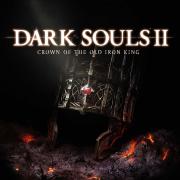Dark Souls II: Crown of the Old Iron King
In Crown of the Old Iron King, one does not merely play; one descends. The player is cast into a world of scorched ruins, iron monstrosities, and a tower that seems less built than conjured from the essence of suffering itself. Gameplay here is not simply mechanical trial—it is ordeal, a deliberate orchestration of pain that forces the spirit to confront its own limits. Each hallway burns with the lesson: the abyss is not outside of us, but within, and only those who dare to face it emerge stronger.
Nietzsche tells us that suffering is not to be fled but embraced as the crucible of greatness. This DLC embodies that maxim. Every corridor feels designed to remind the player that progress is purchased in blood and persistence, not in ease. To fall here is inevitable; to rise again is the commandment. In this repetition lies the eternal recurrence, the demand that we will our own suffering again and again until we can affirm it with joy.
The bosses—hulking engines of wrath forged from the Old Iron King’s legacy—do not exist merely to block progress. They exist as mirrors. They confront the player with the raw violence of will untempered by reason. In defeating them, the player does not simply conquer; they transmute weakness into strength. Triumph here is not shallow victory but an act of self-overcoming, a hymn to what Nietzsche calls the Übermensch: the one who creates meaning from struggle.
Yet Crown of the Old Iron King is not without a certain melancholy. Its ash-laden arenas whisper of empires turned to ruin, ambition consumed by flame. The world reminds us that all thrones are temporary, that iron itself rusts, that even kings burn. But it does not leave us in despair. Instead, it beckons us to forge anew, to grasp the hammer and strike our own shape upon the anvil of existence.
Thus the DLC is not mere entertainment. It is philosophy in the form of ordeal, art sculpted from torment. It whispers Nietzsche’s eternal challenge: Do you will this again? Will you face fire, collapse, and futility once more, not cursing fate, but affirming it? For those who answer yes, victory is more than progress—it is transcendence.
Nietzsche tells us that suffering is not to be fled but embraced as the crucible of greatness. This DLC embodies that maxim. Every corridor feels designed to remind the player that progress is purchased in blood and persistence, not in ease. To fall here is inevitable; to rise again is the commandment. In this repetition lies the eternal recurrence, the demand that we will our own suffering again and again until we can affirm it with joy.
The bosses—hulking engines of wrath forged from the Old Iron King’s legacy—do not exist merely to block progress. They exist as mirrors. They confront the player with the raw violence of will untempered by reason. In defeating them, the player does not simply conquer; they transmute weakness into strength. Triumph here is not shallow victory but an act of self-overcoming, a hymn to what Nietzsche calls the Übermensch: the one who creates meaning from struggle.
Yet Crown of the Old Iron King is not without a certain melancholy. Its ash-laden arenas whisper of empires turned to ruin, ambition consumed by flame. The world reminds us that all thrones are temporary, that iron itself rusts, that even kings burn. But it does not leave us in despair. Instead, it beckons us to forge anew, to grasp the hammer and strike our own shape upon the anvil of existence.
Thus the DLC is not mere entertainment. It is philosophy in the form of ordeal, art sculpted from torment. It whispers Nietzsche’s eternal challenge: Do you will this again? Will you face fire, collapse, and futility once more, not cursing fate, but affirming it? For those who answer yes, victory is more than progress—it is transcendence.
Mini Review: In Crown of the Old Iron King, one descends into a furnace where man’s will is tested by molten steel and forgotten kings. It is a trial by fire, punishing yet exalting, forging strength from despair. Here suffering is not a curse but a crucible; every victory is a hymn to the Übermensch rising from ash.

